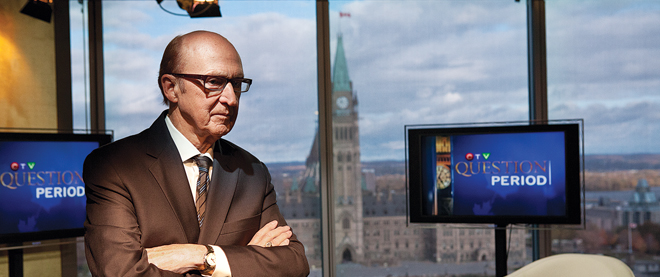From Trudeau’s woman troubles to Reform MPs’ moral missteps
Craig Oliver recounts life on the Hill in ‘Oliver’s Twist: The Life and Times of an Unapologetic Newshound’
Photograph by Peter Bregg
Share

When not distracted by their métier—bearing witness, asking questions, conveying facts—journalists do what comes most naturally to them: they drone on, drop names and deliver glib pronouncements on those they cover. Reporters who write memoirs risk bronzing that same tripe. How lucky we are that Craig Oliver, best known for his political reporting for CTV, often opposite Lloyd Robertson, saw the dangers and dove in anyway, writing a book at once human and sharp.
The Dickensian allusion in its title, Oliver’s Twist: The Life and Times of an Unapologetic Newshound, is earned: he grew up in tough Prince Rupert, B.C., both his parents alcoholics; his father made a job of his hobby, becoming a bootlegger. When his mother vanished, turning to taxi driving and another man, Oliver’s father shopped him around to various paid foster homes, an unhappy experience. One surrogate, Mabel, was particularly tormenting. “I forgot myself and called her ‘Mommy,’ ” he writes. “I had a real mother, Mabel told me, but she was an immoral woman who had left me behind.”
Oliver otherwise fended for himself, growing up among prostitutes, gamblers and other modern-day pirates—a one-legged steam-bath owner and Ricardo the Hook, who lost a hand in the war. “I felt no loneliness and in fact revelled in the novelty of my circumstances,” he writes. Billeted with a Christian family, he briefly became a target for conversion, a failed project: “Too much untried temptation lay ahead, and I was willing also to give the devil a chance to convert me.”
Journalism offered a way into that larger life. He joined the CBC at 18 and within a few years had begun reporting from Regina, opening the CBC’s first bureau in the legislature under Tommy Douglas. From there his career rollicked onwards: at CTV he helped launch Canada AM, helmed the Washington bureau and reported from war zones in Central and South America.
But it is Ottawa that stars here, and Oliver brims with insight into its great figures. Pierre Trudeau, a friend and canoeing partner—in the wilds, Oliver witnessed Trudeau blithely approach a family of grizzly bears, and later saw an older, frailer Trudeau tip into powerful rapids, nearly drowning—injects emotion into his taught, lively prose. He also generates laughs. Oliver was with Trudeau and one of Trudeau’s girlfriends one night when another stunning woman suddenly arrived; the prime minister had inadvertently made two dates for the same evening. When one of the women angrily told the group that an RCMP officer had gossiped about the number of girlfriends traipsing through 24 Sussex, Trudeau replied: “Would you be able to recall that Mountie’s name? I would like to arrange for him to spend the rest of his career mushing huskies in Tuktoyaktuk.”
Later, Brian Mulroney dangled the possibility of a Senate seat, a reflection of what Oliver calls his “belief that every person had his price” (he demurred, citing the pay cut). Kim Campbell was “a charming and disarming” PM who once left Bill Clinton “smitten” (she and Clinton shared a limo: “If he did not make a grab for her in that armoured car, I’d be surprised”). In private, the late-career, allegedly folksy Jean Chrétien grew “self-absorbed, edgy . . . Any topic of conversation was soon narrowed to focus on him.” Oliver notes the “stiff moralism” of the early Reform party and argues life in Ottawa changed its MPs, some of whom now sit as Tories; he estimates “20 per cent of the 2010 Harper cabinet had left their spouses, openly taken lovers, switched sexual preferences, or otherwise been undone by lonely nights and alcohol.”
He reveals glaucoma has left him legally blind, another instance where he exposes a vulnerability rarely seen on camera. “I have written this book in a race against inevitable blindness,” he writes (he dictated much of it, and otherwise used software for the blind). In conversation he approaches questions about why he wrote the book with an aw-shucks self-deprecation, telling Maclean’s: “I heard an interview with some guy on the radio who’d just had a book published and his life was so uninteresting I thought, ‘Holy Christ, if this guy can get a book published, I can too!’ ”
His most compelling character here, though, is his mother, who returned to him late in his childhood and stayed, variable but loving, a decent woman diminished by booze. It is to her that the book is dedicated. A fervent Liberal, she once cornered Oliver during the leadership race between Chrétien and John Turner, demanding to know “why I was working for ‘that jerk, Turner.’ I explained that I was covering Mr. Turner, not working for him, to which she replied, ‘It was damn hard to tell the difference.’ ” And so perhaps his toughest editor was his mother.